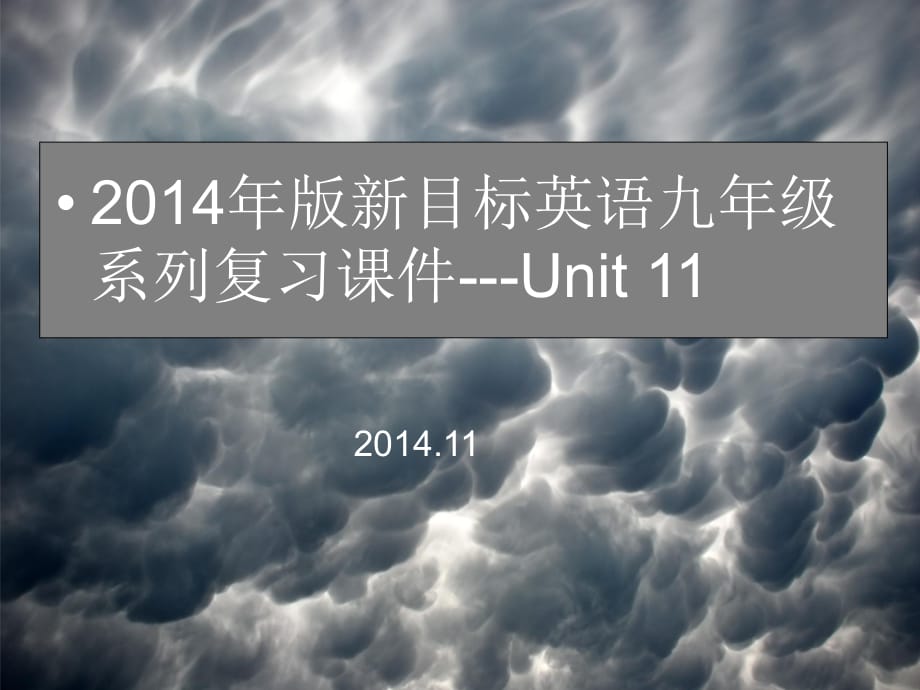《人教版九年級(jí)英語新目標(biāo)Unit_11復(fù)習(xí)課件(共38張PPT)》由會(huì)員分享�,可在線閱讀,更多相關(guān)《人教版九年級(jí)英語新目標(biāo)Unit_11復(fù)習(xí)課件(共38張PPT)(38頁(yè)珍藏版)》請(qǐng)?jiān)谘b配圖網(wǎng)上搜索����。
1����、2014年版新目標(biāo)英語九年級(jí)系列復(fù)習(xí)課件-Unit 112014.11 重 點(diǎn) 詞 組 復(fù) 習(xí) 1. would rather 2. drive sb crazy 3. the more,the more 4. be friends wtih sb 5. leave out feel left out 6. call in 7. neither.nor 8. have a lot in common 9. each time 1. 寧愿2. 使某人發(fā)瘋3. 越越4. 成為某人的朋友 5. 忽略 �����, 不提及 感到被忽略6. 召來 ����,叫來7. 既不也不8. 有更多的相似之處9. 每當(dāng)時(shí)候 10.
2�����、feel like doing 11. to start with12. let sb down13. kick sb off14. be hard on sb15. rather than 16. pull together 17. to ones relief 18. in agreement 10. 想要做11. 起初�����,剛開始時(shí)12. 讓某人失望13. 開除某人14. 對(duì)某人苛刻15. 而不是16. 齊心協(xié)力�,通力合作17. 使某人解脫的是18. 同意, Grammar Focus The loud music makes me nervous. Soft and quiet music
3����、 makes me relaxed. Money and fame dont always make people happy. She said that the sad movie made her cry. make的使役用法: make作使役動(dòng)詞,意為“使����;迫使”�����,其常用結(jié)構(gòu)如下: make + sb. + adj. 意為“使得某人”�����。如: The news made him happy. 這個(gè)消息讓他很開心�?����?捎玫降男稳菰~有: happy����,pleased,surprised�,angry, annoyed�����,sad�,upset�����,unhappy�����,worried,anxious����,excite
4、d�����,relaxed�,stressed out,tense����,calm,scared����,comfortable�,sick make + sb. + do sth.意為“使得某人做某事”����。(不能帶不定式符號(hào)to) 。如: Nothing will make me change my mind. 什么也改變不了我的想法����。注意:make sb. do sth.的被動(dòng)結(jié)構(gòu)是sb. be made to do sth.,意為“某人被迫做某事”�。當(dāng)make 用于被動(dòng)語態(tài)時(shí),必須帶不定式符號(hào)to�。如: He was made to lie in bed all day.他被迫每天躺在床上。 Language po
5�����、ints 1. Id rather go to the Blue Ocean Restaurant because I like to listen to quiet music while Im eating. would rather do sth.�����,意為“寧可�����,寧愿 還是好些”�����。 e.g. Id rather play tennis than swim. 比起游泳我寧愿去打臺(tái)球。 2. Yes, she was, and waiting for her drove me crazy. drive v. 迫使 drive sb.+adj.�,使某人怎樣drive sb. crazy/mad
6、使某人發(fā)瘋/發(fā)狂 e.g. That thing almost drive me crazy. 那件事幾乎要使我發(fā)狂了�。 Youll drive mum mad one of these days. 你這樣總有一天會(huì)把媽媽急瘋了的。 3. What happened? happen 發(fā)生�����,不及物動(dòng)詞�, 常見的用法有 (1) “sth.+happen+地點(diǎn)/時(shí)間”�,“某地/某時(shí)發(fā)生了某事” e.g. Whats happening outside? 外面發(fā)生什么事了? (2) “sth.+happen to+sb.” 意為“某人出了某事(常指不好的事發(fā)生在某人身 上)”。 e.g. A car
7�、accident happened to him yesterday. 昨天他發(fā)生了交通事故。 (3) “sb.+happen+to do sth.” 意為“某人碰巧做某事” e.g. I happened to meet her in the street. 我碰巧在街上遇見她�����。 4. The more I got to know Julie, the more Ive realized that we have a lot in common. the+比較級(jí)+從句 �,the +比較級(jí)+從句 “越, 越” e.g. The harder you work, the greater prog
8、ress you will make. 你越用功����,進(jìn)步就越大�。 5. Why dont you ask Alice to join you each time you do something with Julie? Why dont +sb.+do sth.? =Why not + do sth.? 為何不�?用來提出建議或勸告。 e.g. Why dont you go with us? Why not go with us? 你為什么不和我們一起去呢�����? 6. Then she wont feel left out. to be/feel left out 表示“被遺忘�����;被忽略����;被冷落”之類
9、的意思�����。 e.g. No one speaks to him, he always feels left out. 沒人跟他講話�,他總是覺得被人冷落。 7. He slept badly and didnt feel like eating. 他的睡眠很糟糕�,他也不想吃東西。 feel like doing 想做某事 e.g. I feel like having a drink. 我想喝點(diǎn)酒�����。 8. His face was always pale as chalk. 他總是面色蒼白。 (as) pale as chalk是一種明喻修辭結(jié)構(gòu)�����,雖然英語把蒼白比作chalk(白堊����,一種白色石灰?guī)r
10、)����,但漢語不可真譯�,相當(dāng)于我們說的“慘白;蒼白”����。 e.g. You look as pale as chalk today. Whats wrong? 今天你看著面色蒼白,哪里不舒服����?另外值得注意的是,漢語描述不健康的人的面部顏色時(shí)常用“白”字�����,如“煞白;蒼白�;灰白”等等,英語常用pale來表達(dá)�。 e.g. He suddenly went pale. 他突然面色蒼白。 9. One day, a doctor was called in to examine the king. 一天�����,醫(yī)生被傳喚去給國(guó)王檢查身體�����。 call in 召來�����,叫來 e.g. He only waited two
11�����、minutes before he was called in. 他只等了兩分鐘就被叫了進(jìn)去����。 Call in the doctor at once. 馬上去請(qǐng)醫(yī)生來。 call短語歸納 call back 喚回,叫回�; 回電話,再打電話 call up (給)打電話����; 想起,回憶起 call away 叫走����,叫開 10. Neither medicine nor rest can help him. 藥物和休息對(duì)他都無幫助。 neither 表示“兩者都不”�����; 常用詞組:neithernor 既不也不�,謂語動(dòng)詞跟最近的主語一致 e.g. Neither he nor I am from Be
12、ijing. 他和我都不在北京����。 both, either 對(duì)某人過于嚴(yán)厲; 以刻薄的方式批評(píng)�����、對(duì)待某人 e.g. Today some teachers are too hard on their students. 如今一些老師對(duì)學(xué)生要求過于嚴(yán)厲����。 Perhaps Im too hard on my daughter. 或許我對(duì)我女兒要求過頭了�����。 20.Besides, wining or losing is only half the game. besides “除以外還有”����,表示包括后面提到的人或物在內(nèi)����。 except “除去”, 表示不包括后面所提到的人或物在內(nèi)����。 e.g. All
13、 the students went to the park except Jim. (Jim沒去) Lucy went to the cinema besides Lily. (Lily 也去了) 21.The next day, Peter went to soccer practice with courage rather than fear in his heart. courage n. 勇氣�;勇敢 rather than 并非;而不是 e.g. I, rather than you, should do the work. 該做這工作的是我而不是你�。 The most valua
14、ble thing is time, rather than money. 最珍貴的是時(shí)間�,而不是金錢。 22.But I think if we continue to pull together, were going to win the next one. pull together 齊心協(xié)力�;通力合作 e.g. If all of us pull together, there must be something we can do to improve the environment. 如果我們都能齊心協(xié)力,我們一定能做點(diǎn)什么來改善環(huán)境�����。 Complete the followin
15、g sentences. 1. 他父親為了賺錢�,從早忙到晚。 His father is busy all day in order to _ _. 2. 看足球賽使我瘋狂����。 _ football game _ _ _ . 3. 輕柔的音樂使約翰昏昏欲睡。 The soft music _ John _. make moneyWatching makes me crazy makes sleepy 4. 紅色使人們吃得更快些�����。 The color red _ people _ faster. 5. 長(zhǎng)時(shí)間等她使我生氣了�。 Waiting a long time for her _ _ _. (
16、makes me angry)makeseat make memoney 1.My teachers often encourage me _ more friends but I find it difficult. Your teachers idea is right. The more friends you make, _ you will be. 【2014達(dá)州】 A. to make; the more happy B. to make; happier C. making; the happier D. to make; the happier中 考 鏈 接 2. Which
17�、of the two magazines will you take? Ill take _ though I find _ of them are very useful to me. 【2014黃岡】 A. all; both B. either; either C. either; neither D. either; both 3.-George, how can you prove the earth is round? -I cant, sir. _, I never said it was.(2013年河南 ) A. Then B. However C. Besides D. I
18、nstead 4-Driving less, walking more is good for our health. -So Id rather_ an hours walk to work than consider _ a car. (2013年襄陽(yáng)市 ) A. take, drive B. take, to drive C. take, driving D. taking, driving 5.-We all like Miss Wang. -I agree with you. She always makes her English class _. (2011福州) A. inte
19����、rested B. interest C. interesting 6.He lost his key. It made him _ in the cold to wait for his wifes return. (2013重慶市 ) A. to stay B. stayed C. stays D. stay 7.-How can I get well along with others, father? -Try to smile to others, boy. That will make _ much _.(2010宜昌市) A. them, easier B. them, more easy C. it, easy D. it, easier
 人教版九年級(jí)英語新目標(biāo)Unit_11復(fù)習(xí)課件(共38張PPT)
人教版九年級(jí)英語新目標(biāo)Unit_11復(fù)習(xí)課件(共38張PPT)

